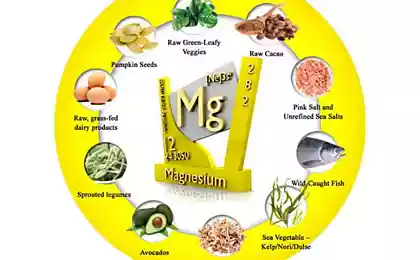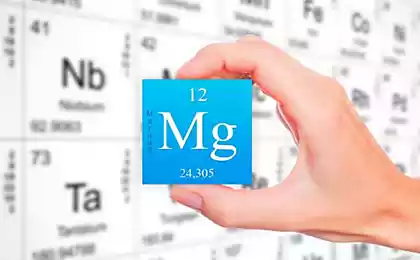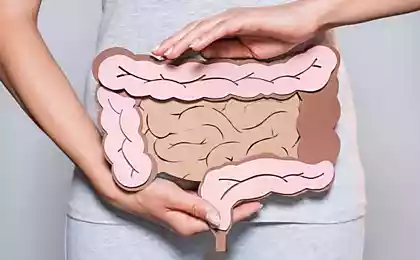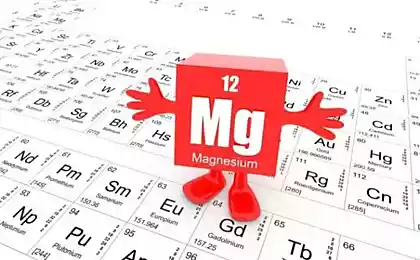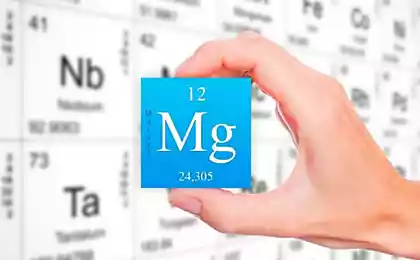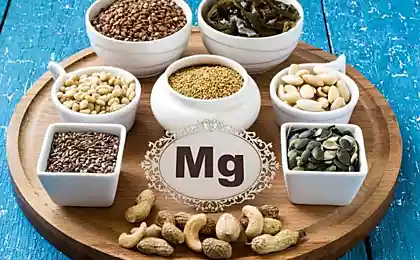522
Attention! Danger signs: the lack of magnesium in the body
Magnesium: an element of strength, health and peace
Mineral substances important for life not less, than vitamins. Scientists have found that the human body is a periodic table in miniature, where there are (though in miniscule amounts), even heavy metals and radioactive elements. Getting outside in large doses, they can cause lead poisoning and cause serious disease, that's why all food should be carefully investigated for safety.
Macro - and micronutrients are essential components of the body, and if the expenditure they are not replenished, that is not come from food or from nutritional supplements, their emergency supply is starting to dry up, developing pathology.
Magnesium (MD) - a representative of the group of macronutrients, the concentration of which in the body of every living individual is from 0.001 to 60 mass%. He takes part in many processes, acting as antistress, protivotoksicheskoe and Pro-tollerence factor, protects against ionizing radiation, regulates temperature, stimulates phagocytosis. Magnesium ions are relaxing and reduce the sensitivity of the receptors.
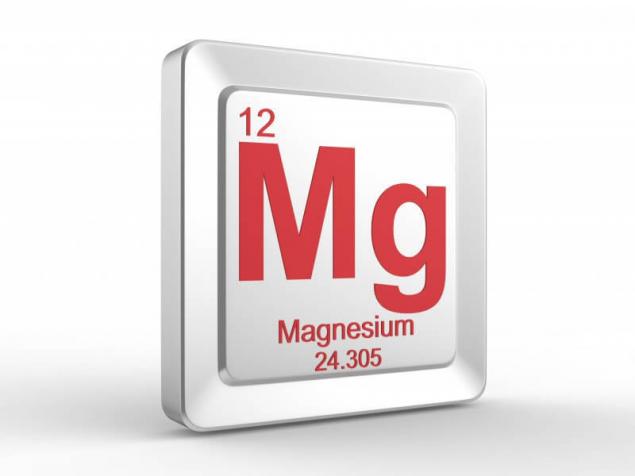
Magnesium and matters of the heart
Magnesium deficiency in the body, even not too significant, can be the cause of cardiovascular disease, arrhythmias and stroke. Unfortunately, the lethal outcome in our difficult time most often comes from zabolotney heart. This is facilitated by numerous stresses, anxiety and water.
Oddly enough, but we hardly think about how dependent and depends on whether the state of the myocardium of the water quality. It turns out that in areas where it is hard, from heart disease die much less frequently, because in addition to calcium, many other minerals, primarily magnesium.
So, people who drink hard water are less prone to heart attacks, not pressure, they have little cholesterol in the blood. Some researchers explain this with the fact that the calcium and magnesium from hard water combine in the intestine with saturated (solid) fats, forming Soaps a substance that is excreted from the body. Due to this, a person gets rid of unnecessary fats and excess cholesterol and they are no longer threatening heart attack, not cause of circulatory diseases, hypertension, obesity.
On the other hand, there is another regulator of cholesterol, which is also associated with magnesium. This is the amino acid lecithin. It is in the body but cannot be synthesized without enzyme containing pyridoxine, and this enzyme acts only in the presence of magnesium.
To reduce the level of cholesterol in the blood should enter into the diet foods rich in magnesium, vitamin B6 and choline and Inositol, which are in wheat germ, yeast, liver, bran. Even at normal concentrations of pyridoxine, but the meager amounts of magnesium lecithin to produce will not, which again will lead to an increase in the percentage of cholesterol, and the more he increases, the greater the need for magnesium.
Therefore, deficiency of this element leads to increased flow into cells calcium ions and, accordingly, the displacement of the already lacking magnesium. The result of such ionic imbalance is the cellular damage of the myocardium, which leads to functional changes in cardiac activity, such as angina, heart attack, heart failure, heart rhythm disturbances.
Take care of your nerves, eat more magnesium
The nervous system is very sensitive to the magnesium content in the body. Its lack causes anxiety, nervousness, fear, impatience, insomnia and fatigue. Often people complain about unreasonable headaches, not knowing that they need magnesium. For example, injection of sulphide of magnesium has on the nervous system calming effect.
When a person is angry or nervous, this element is actively excreted from the body, therefore, in order not to get sick, you should smile more often.
Magnesium and women's health
Physiology of men and women differently. This generally explains the differences in consumption of certain items. Thus, a strong floor in the day to 350 mg of magnesium, mild — to 280 mg. But in a woman's life there are moments when the body is asking to increase the dose of receipt of certain substances. During pregnancy, for example, it requires two to three times more magnesium.
In case of deficit, the expectant mother may experience symptoms such as excessive irritability, susceptibility to stress, insomnia, asthenia, back pain, and seizures. Sometimes there is increased tone of the uterus which can cause miscarriage.
No less dangerous, especially in the last months of pregnancy is preeclampsia (late toxicosis) is a relatively common complication, which, along with other problems is characterized by irregular blood pressure and water retention in the body. In this case, the aid of supplementation with magnesium.
An important factor affecting the level of magnesium in the body women, premenstrual syndrome (PMS). In normal healthy women before menstruation increases the amount of magnesium in red blood cells and those suffering from PMS, on the contrary, it falls by 20-40% compared to the norm. To somehow alleviate the condition, to adjust the content of magnesium. For this a special magnesium diet, and medication and dietary supplements that will enable to minimize the frequency of abrupt changes of mood, to cope with the discomfort and yeast infections.
Women that use oral contraceptives, also not enough magnesium. Especially dangerous is his lack of menopause, as it is one of the reasons for the development of osteoporosis. This is because magnesium works with calcium and phosphorus is a major structural element for optimal bone density.
Magnesium and sport
In athletes its relationship with magnesium. He is known to be one of the activators of enzymes and is necessary for the formation of high-energy relationships and the normal functioning of the neuromuscular tissue. Great physical work done by the athletes, first and foremost falls on the nervous system and muscles. This will consume a lot of energy, artificially creates a shortage of magnesium, and even a special diet is not able to cover his loss. He comes out with perspiration and moves into the intracellular region that is active in muscle cells, so at high load, it is recommended to introduce a special drugs.
Where to get magnesium
Under normal diet you can obtain about 300 mg of magnesium a day (with average daily norm of 350 mg). But to be healthy and feel vigorous, not to MOPE and not be upset on trifles, to fight stress, this item will take about 600 mg a day, and sometimes more.
The richest sources of magnesium among the foods are nuts, beans, sunflower seeds and buckwheat honey.
Under the theory of seasonal food, it may be advisable to saturate the body with magnesium the following nature:
Join us in Facebook , Vkontakte, Odnoklassniki
Source: www.policlinica.ru/sovet_vrachaadc3.html
Mineral substances important for life not less, than vitamins. Scientists have found that the human body is a periodic table in miniature, where there are (though in miniscule amounts), even heavy metals and radioactive elements. Getting outside in large doses, they can cause lead poisoning and cause serious disease, that's why all food should be carefully investigated for safety.
Macro - and micronutrients are essential components of the body, and if the expenditure they are not replenished, that is not come from food or from nutritional supplements, their emergency supply is starting to dry up, developing pathology.
Magnesium (MD) - a representative of the group of macronutrients, the concentration of which in the body of every living individual is from 0.001 to 60 mass%. He takes part in many processes, acting as antistress, protivotoksicheskoe and Pro-tollerence factor, protects against ionizing radiation, regulates temperature, stimulates phagocytosis. Magnesium ions are relaxing and reduce the sensitivity of the receptors.

Magnesium and matters of the heart
Magnesium deficiency in the body, even not too significant, can be the cause of cardiovascular disease, arrhythmias and stroke. Unfortunately, the lethal outcome in our difficult time most often comes from zabolotney heart. This is facilitated by numerous stresses, anxiety and water.
Oddly enough, but we hardly think about how dependent and depends on whether the state of the myocardium of the water quality. It turns out that in areas where it is hard, from heart disease die much less frequently, because in addition to calcium, many other minerals, primarily magnesium.
So, people who drink hard water are less prone to heart attacks, not pressure, they have little cholesterol in the blood. Some researchers explain this with the fact that the calcium and magnesium from hard water combine in the intestine with saturated (solid) fats, forming Soaps a substance that is excreted from the body. Due to this, a person gets rid of unnecessary fats and excess cholesterol and they are no longer threatening heart attack, not cause of circulatory diseases, hypertension, obesity.
On the other hand, there is another regulator of cholesterol, which is also associated with magnesium. This is the amino acid lecithin. It is in the body but cannot be synthesized without enzyme containing pyridoxine, and this enzyme acts only in the presence of magnesium.
To reduce the level of cholesterol in the blood should enter into the diet foods rich in magnesium, vitamin B6 and choline and Inositol, which are in wheat germ, yeast, liver, bran. Even at normal concentrations of pyridoxine, but the meager amounts of magnesium lecithin to produce will not, which again will lead to an increase in the percentage of cholesterol, and the more he increases, the greater the need for magnesium.
Therefore, deficiency of this element leads to increased flow into cells calcium ions and, accordingly, the displacement of the already lacking magnesium. The result of such ionic imbalance is the cellular damage of the myocardium, which leads to functional changes in cardiac activity, such as angina, heart attack, heart failure, heart rhythm disturbances.
Take care of your nerves, eat more magnesium
The nervous system is very sensitive to the magnesium content in the body. Its lack causes anxiety, nervousness, fear, impatience, insomnia and fatigue. Often people complain about unreasonable headaches, not knowing that they need magnesium. For example, injection of sulphide of magnesium has on the nervous system calming effect.
When a person is angry or nervous, this element is actively excreted from the body, therefore, in order not to get sick, you should smile more often.
Magnesium and women's health
Physiology of men and women differently. This generally explains the differences in consumption of certain items. Thus, a strong floor in the day to 350 mg of magnesium, mild — to 280 mg. But in a woman's life there are moments when the body is asking to increase the dose of receipt of certain substances. During pregnancy, for example, it requires two to three times more magnesium.
In case of deficit, the expectant mother may experience symptoms such as excessive irritability, susceptibility to stress, insomnia, asthenia, back pain, and seizures. Sometimes there is increased tone of the uterus which can cause miscarriage.
No less dangerous, especially in the last months of pregnancy is preeclampsia (late toxicosis) is a relatively common complication, which, along with other problems is characterized by irregular blood pressure and water retention in the body. In this case, the aid of supplementation with magnesium.
An important factor affecting the level of magnesium in the body women, premenstrual syndrome (PMS). In normal healthy women before menstruation increases the amount of magnesium in red blood cells and those suffering from PMS, on the contrary, it falls by 20-40% compared to the norm. To somehow alleviate the condition, to adjust the content of magnesium. For this a special magnesium diet, and medication and dietary supplements that will enable to minimize the frequency of abrupt changes of mood, to cope with the discomfort and yeast infections.
Women that use oral contraceptives, also not enough magnesium. Especially dangerous is his lack of menopause, as it is one of the reasons for the development of osteoporosis. This is because magnesium works with calcium and phosphorus is a major structural element for optimal bone density.
Magnesium and sport
In athletes its relationship with magnesium. He is known to be one of the activators of enzymes and is necessary for the formation of high-energy relationships and the normal functioning of the neuromuscular tissue. Great physical work done by the athletes, first and foremost falls on the nervous system and muscles. This will consume a lot of energy, artificially creates a shortage of magnesium, and even a special diet is not able to cover his loss. He comes out with perspiration and moves into the intracellular region that is active in muscle cells, so at high load, it is recommended to introduce a special drugs.
Where to get magnesium
Under normal diet you can obtain about 300 mg of magnesium a day (with average daily norm of 350 mg). But to be healthy and feel vigorous, not to MOPE and not be upset on trifles, to fight stress, this item will take about 600 mg a day, and sometimes more.
The richest sources of magnesium among the foods are nuts, beans, sunflower seeds and buckwheat honey.
Under the theory of seasonal food, it may be advisable to saturate the body with magnesium the following nature:
- in the winter — honey, raisins, dates, apricots, prunes, nuts, cocoa, oat, wheat, buckwheat, barley porridge:
- spring — dill, parsley, spinach, lettuce;
- in the summer — cherries, black currants, peas, beans;
- fall — watermelon, beets, carrots;
- year round — bananas and sunflower seeds.
Join us in Facebook , Vkontakte, Odnoklassniki
Source: www.policlinica.ru/sovet_vrachaadc3.html





